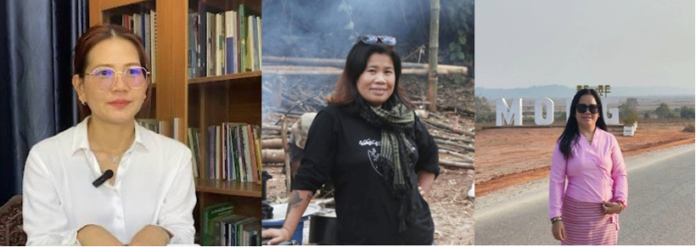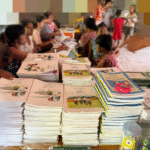International Women’s Day is observed on 8 March every year, a day dedicated to recognizing women’s rights, equality, and their potential. However, in Myanmar, following the military coup, the political situation and armed conflicts have led to the neglect of women’s rights, with numerous instances of exploitation and abuse coming to light.
On this International Women’s Day, Shan News has compiled the voices of women’s rights activists in Shan State, highlighting the struggles endured by local women in conflict-affected areas. These include experiences of domestic violence, exploitation, and other hardships and challenges they face.
Nang Moon Moon Paung (A local women’s rights activist)
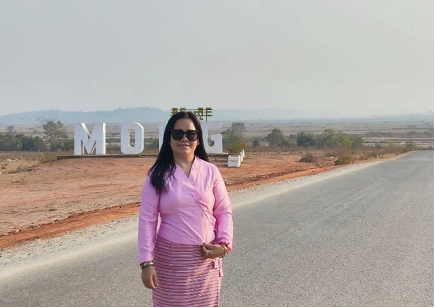
Women, mothers with children, and heavily pregnant women have had to travel long distances to flee the fighting, and we’ve seen cases where they miscarry as a result. In such circumstances, these women can no longer enter the workforce, so they end up living in displacement camps, relying solely on aid. Some don’t even have a place to stay anymore—entire homes have been burned to ashes. Everything has to be rebuilt from scratch. Since Operation 1027, some armed groups have gained money and power. With that authority, they’ve started exploiting women, using their position to take advantage of them. Young women in rural areas are often the ones who suffer the most.
After COVID and the coup, job opportunities have vanished. Even if they take up daily wage work, they might earn just 10,000 kyats a day—enough to work one day and then rest for three or four days. That makes it impossible to support their families. In the end, some have resorted to selling themselves into sex slavery. Listening to their struggles breaks my heart. I keep thinking about how we can free these young women from such traps. But in the current situation, all I can do is raise awareness.
I’m not in a position to take responsibility for their livelihoods. I believe only when compassionate people come together to rebuild this country will we be able to liberate these women from such lives. To the armed groups doing this, I’d say: You claim to be fighting against tyranny, but you’ve forgotten that you’re becoming tyrants yourselves. Just because you have power doesn’t mean you should do whatever you want—I don’t want that to happen. I want your organizations to maintain discipline and order. You need to abide by your own rules and laws. Treat other people’s daughters and sons as if they were your own, and treat others’ families with the same empathy you’d show your own mother. That’s the kind of humanity we need.
Comrade Su Su (P3 1109 Logistics Unit)
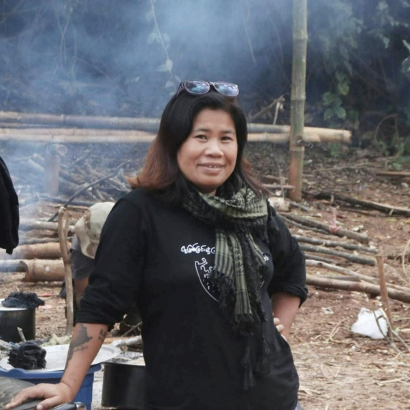
Right from the moment I joined the forces, I had my mind set on getting into combat roles. But being a woman, there’s this assumption that the frontlines are too chaotic for us, that women are weak or that we’d struggle with food and living conditions. Because of those concerns, they sometimes don’t let us join. If this revolution doesn’t succeed, we’ll keep facing these kinds of situations—I’ll keep seeing them. There are so many kids younger than me losing limbs or even their lives. Whenever I think about giving up, I realize it wouldn’t be fair to these people, so even though I’m a woman, I keep pushing forward.
Here, I’ve witnessed more conflicts between unmarried couples than married ones—things like physical fights breaking out. It happens among the resistance fighters themselves. In those kinds of situations, the relevant battalions and units do stand firmly on the women’s side and offer support. But I haven’t really noticed any solid efforts toward education or awareness programs. I’d like to see more of that happening.
Even though I’m a woman, I know I have capabilities, and I’ve proven I can do the work. We’re all moving forward with the absolute belief that this revolution will succeed. I don’t want them to overlook women for leadership roles just because of our gender. If women are capable, I want them to be given those positions. I’d like to see opportunities handed out without gender discrimination—by giving us these roles, it’d show that in some areas, women can actually do better. That’s what I want to prove.
Nang Kham Mine (Shan Women Action Network)
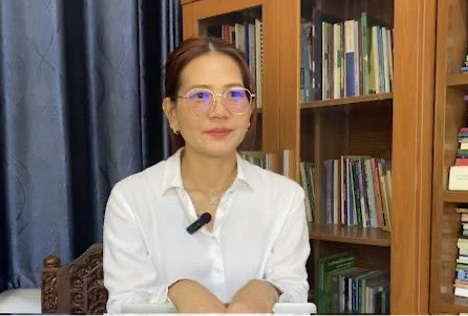
As long as the war continues, the damage keeps piling up. Since Operation 1027, the battlefield has expanded, reaching even urban areas. Among those fleeing are pregnant women, young children, and mothers who are running into the forests without any help or support. According to data we’ve collected for 2023 and 2024, there have been over 80 cases of violence against women. That’s just based on the data we’ve managed to gather—there could be many more incidents in areas we can’t reach. Since Operation 1027 began, our ability to collect data has become more limited, so there are likely a lot of cases we don’t even know about.
Underage girls are being trafficked, and some are forced into sex work or jobs at KTVs just to survive. Now, we’re also frequently hearing reports of the bodies of young women turning up, with no one knowing who killed them. There’s a case of an underage girl taken by the MNDAA (Myanmar National Democratic Alliance Army) —she hasn’t been released yet. It’s been almost a month since she was captured. This kind of thing is completely unacceptable. She’s only 15 years old—this is violence. I’m worried about her physical and mental health.
As for us, we’re doing what we can within our capacity, focusing on education and spreading awareness to prevent these things from happening to girls. Those in power, the decision-makers, need to establish a transparent legal system in their regions. It’s also critical that those with authority don’t commit these acts themselves. If the war keeps going, if it drags on like this, these incidents will just keep happening. Rather than focusing only on helping the victims escape their suffering, I want to tell those directly involved—the key players—that it’s time to stop this.
Sent by Shan News.

